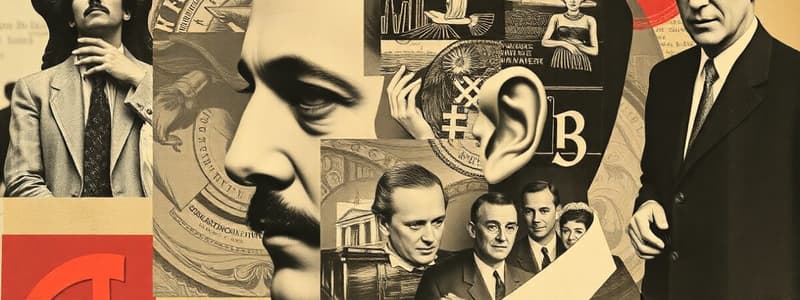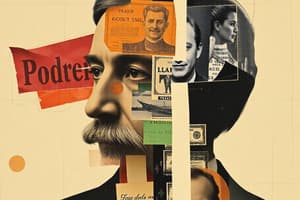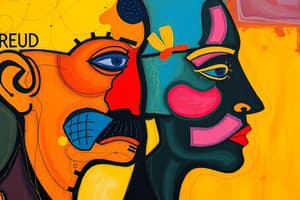Podcast
Questions and Answers
Which theory emphasizes the importance of childhood experiences in shaping personality?
Which theory emphasizes the importance of childhood experiences in shaping personality?
- Psychoanalysis (correct)
- Roger’s Self Theory
- Adler’s Theory of Personality
- Behaviorism
Which theory posits that a person's self-concept is central to understanding their personality?
Which theory posits that a person's self-concept is central to understanding their personality?
- Psychoanalysis
- Trait Theory
- Adler’s Theory of Personality
- Roger’s Self Theory (correct)
What aspect does Adler’s Theory of Personality primarily focus on?
What aspect does Adler’s Theory of Personality primarily focus on?
- Unconscious motivations
- Genetics and biology
- Reinforcement and punishment
- Social context and inferiority (correct)
Which approach is likely to downplay the role of environmental factors in personality development?
Which approach is likely to downplay the role of environmental factors in personality development?
Which of these theories is least concerned with the conscious awareness of the individual?
Which of these theories is least concerned with the conscious awareness of the individual?
What does unconditional positive regard promote in individuals?
What does unconditional positive regard promote in individuals?
How does unconditional positive regard differ from conditional acceptance?
How does unconditional positive regard differ from conditional acceptance?
What is a potential outcome of lacking unconditional positive regard?
What is a potential outcome of lacking unconditional positive regard?
Which statement reflects the essence of unconditional positive regard?
Which statement reflects the essence of unconditional positive regard?
In what way can unconditional positive regard influence personal relationships?
In what way can unconditional positive regard influence personal relationships?
What does the term 'anima' refer to in Jung's Theory?
What does the term 'anima' refer to in Jung's Theory?
Which of the following best describes the concept of 'animus' in Jung's Theory?
Which of the following best describes the concept of 'animus' in Jung's Theory?
Anima and animus in Jung's Theory primarily represent which duality?
Anima and animus in Jung's Theory primarily represent which duality?
Which of the following characteristics is most likely associated with the anima?
Which of the following characteristics is most likely associated with the anima?
In the context of Jung's Theory, how does the anima affect a man's behavior?
In the context of Jung's Theory, how does the anima affect a man's behavior?
What is an effective way for a teacher to support a struggling student?
What is an effective way for a teacher to support a struggling student?
How might someone use their high level of openness constructively?
How might someone use their high level of openness constructively?
Which approach might hinder a student's learning experience?
Which approach might hinder a student's learning experience?
What could be a negative outcome of not acknowledging a student's efforts?
What could be a negative outcome of not acknowledging a student's efforts?
What behavior is most likely associated with high openness in individuals?
What behavior is most likely associated with high openness in individuals?
What might a therapist infer if a person describes a lonely character?
What might a therapist infer if a person describes a lonely character?
How might tests administered by therapists help clients who feel anxious?
How might tests administered by therapists help clients who feel anxious?
Why might someone feel unmotivated, according to this context?
Why might someone feel unmotivated, according to this context?
Which of the following best describes the therapeutic approach mentioned?
Which of the following best describes the therapeutic approach mentioned?
What role does character description play in understanding a person's feelings?
What role does character description play in understanding a person's feelings?
What does the concept of 'shadow' refer to in relation to personality?
What does the concept of 'shadow' refer to in relation to personality?
Which statement best describes the concept of the collective unconscious proposed by Jung?
Which statement best describes the concept of the collective unconscious proposed by Jung?
How do stories about good triumphing over evil relate to Jung's idea of the collective unconscious?
How do stories about good triumphing over evil relate to Jung's idea of the collective unconscious?
In what way is the concept of the 'shadow' significant in understanding personality?
In what way is the concept of the 'shadow' significant in understanding personality?
Which of the following is NOT a characteristic associated with the collective unconscious?
Which of the following is NOT a characteristic associated with the collective unconscious?
Flashcards
Effort Praise
Effort Praise
Encouraging a struggling student by focusing on their effort rather than just their grades. This shows that the teacher values the student's hard work and progress, even if they haven't achieved high marks.
Openness
Openness
The tendency to be curious, open to new experiences, and willing to try new things. People high in openness are often adventurous, imaginative, and enjoy exploring new ideas and cultures.
Personality Theory
Personality Theory
A set of ideas about how personality develops and works.
Psychoanalysis
Psychoanalysis
Signup and view all the flashcards
Adler's Theory
Adler's Theory
Signup and view all the flashcards
Rogers' Self Theory
Rogers' Self Theory
Signup and view all the flashcards
Anima
Anima
Signup and view all the flashcards
Anima/Animus in Jung's Theory
Anima/Animus in Jung's Theory
Signup and view all the flashcards
Animus
Animus
Signup and view all the flashcards
Jung's Theory on Anima/Animus
Jung's Theory on Anima/Animus
Signup and view all the flashcards
Universal Archetypes
Universal Archetypes
Signup and view all the flashcards
Shadow
Shadow
Signup and view all the flashcards
Collective Unconscious
Collective Unconscious
Signup and view all the flashcards
Good Triumphing Over Evil
Good Triumphing Over Evil
Signup and view all the flashcards
Archetype
Archetype
Signup and view all the flashcards
Jung's Theory of the Collective Unconscious
Jung's Theory of the Collective Unconscious
Signup and view all the flashcards
Projection
Projection
Signup and view all the flashcards
Projection (defense mechanism)
Projection (defense mechanism)
Signup and view all the flashcards
Understanding emotions through behavior
Understanding emotions through behavior
Signup and view all the flashcards
Psychological tests
Psychological tests
Signup and view all the flashcards
Difficulty expressing emotions
Difficulty expressing emotions
Signup and view all the flashcards
Unconditional Positive Regard
Unconditional Positive Regard
Signup and view all the flashcards
What is Unconditional Positive Regard?
What is Unconditional Positive Regard?
Signup and view all the flashcards
How does Unconditional Positive Regard help?
How does Unconditional Positive Regard help?
Signup and view all the flashcards
Where can Unconditional Positive Regard be found?
Where can Unconditional Positive Regard be found?
Signup and view all the flashcards
Why is Unconditional Positive Regard important?
Why is Unconditional Positive Regard important?
Signup and view all the flashcards
Study Notes
What is Personality?
- Personality refers to the unique ways individuals think, feel, and act.
- Personality varies from person to person, with examples such as expressive, introverted, aggressive, or uplifting.
- Psychologists have different ideas regarding how personality forms and develops.
Theories of Personality
- These theories explain how personality develops and influences behavior.
- They help understand differences in thoughts, emotions, and actions.
- They are used in therapy, education, and workplaces.
- Key theories include Freud's Psychoanalytic Theory, Jung's Analytical Psychology, Adler's Theory, Maslow's Theory, Rogers' Self Theory, Eysenck's Three Dimensions, Cattell's 16 Personality Factors, Big Five Theory, Skinner's Behavioral Theory, Bandura's Social Learning Theory, Kelly's Personal Construct Theory, Murray's Needs Theory, Rotter's Locus of Control Theory, Allport's Trait Theory, Holland's Career Choice Theory, and Sheldon's Somatotype Theory.
Sheldon's Somatotype Theory
- Proposed by William Sheldon, it suggests that body types influence personality traits.
- Categorizes people into three types: Endomorph, Mesomorph, and Ectomorph.
- Endomorph: Round, soft body; associated with sociability and relaxation.
- Mesomorph: Muscular, athletic body; linked to assertiveness and confidence.
- Ectomorph: Thin, fragile body; related to introversion and sensitivity.
Jung's Analytical Theory
- Presented by Carl Jung, emphasized the collective unconscious and archetypes.
- Concepts include archetypes (universal symbols like the Hero, Shadow, and the Wise Old Man).
- Introversion/Extraversion: Focus on inner thoughts vs. external social interactions.
- Examples: Archetypes are seen in movies like Harry Potter and the Hero. Introversion is being energized by reading, while extraversion is being energized by networking.
Freud's Psychoanalytic Theory
- Founded by Sigmund Freud; revolves around the unconscious mind and psychosexual development.
- Key concepts include Id, Ego, and Superego: Id is impulsive desires, Ego balances desires with reality, and Superego is moral guidance.
- Defense mechanisms are strategies to cope with anxiety (denial and repression).
- Psychosexual stages of development: oral, anal, phallic, latent, and genital stages.
Maslow's Hierarchy of Needs
- Abraham Maslow organized human needs into five levels (starting with basic needs and ending with self-actualization):
- Physiological needs: Basic survival (food, water).
- Safety needs: Security (job, health).
- Belongingness: Relationships, friendships.
- Esteem needs: Respect and recognition.
- Self-actualization: Achieving potential and creativity.
Criticism of Personality Theories
- Lack of empirical evidence is a common critique of some theories, particularly those focusing on underlying concepts like archetypes or implicit processes.
- Limited practical application, especially in situations where more concrete models and metrics are needed.
- Theories may be overly subjective, lacking rigorous scientific method.
- Specific limitations in how theories may view the impact of adult experiences in shaping personality, focusing more on early life stages.
Psychoanalysis (Freud's Theory):
- Developed by Sigmund Freud in 1896; a treatment type focused on the idea that our present is shaped by our past.
- Key concepts include the unconscious mind and defense mechanisms (repression, denial, projection).
- These hidden parts affect our behavior.
- Defense mechanisms protect from uncomfortable emotions (denial, projection, repression)
Psychoanalytic Theory (Id, Ego and Superego)
- Id: The impulsive part of the personality that seeks immediate gratification.
- Ego: The part that tries to balance desires with what is socially acceptable.
- Superego: The moral part of personality that guides with values and rules.
- Psychosexual stages of development:
- Oral stage (0-1 years): Focus on the mouth (e.g., sucking, biting).
- Anal stage (1-3 years): Focus on control over elimination (e.g., potty training).
- Phallic stage (3-6 years): Focus on genitals; boys experience Oedipus complex, girls Electra complex.
- Latency stage (6-puberty): Focus on developing friendships and learning new skills.
- Genital stage (puberty onward): Focus on mature, adult relationships.
Criticism of Psychoanalytic Theory
- Overemphasis on the unconscious mind.
- Lack of scientific evidence for many claims.
- Potential biases in conclusions, such as using a limited sample of mainly upper-class women in his studies.
- Outdated ideas that may not apply to modern thought and practice
Jung's Analytical Theory (continued from before)
- Found by Carl Jung (a colleague of Freud); emphasized the collective unconscious and archetypes.
- Collective unconscious refers to experiences and memories shared across all humans.
- Archetypes represent universal symbolic representations prevalent in human stories and behaviors e.g. Heroes and villains.
- Introversion and extroversion refer to differing orientations toward external versus inner experiences, respectively.
Criticism of Jung's Analytical Theory
- Lacks empirical evidence and relies heavily on subjective interpretation rather than measurable data.
- Overemphasis on spirituality and individuality; considered too abstract for modern scientific applications.
- Its time-consuming nature makes the study of archetypes impractical for those requiring quick psychological solutions.
Adler's Theory of Personality
- Developed by Alfred Adler in 1912; critical of some of Freud's ideas, particularly how he focused on the social realm.
- Focused on individual psychology with a focus on inferiority complex, striving for superiority, and social interest.
- Adler believed feelings of inferiority motivate us to improve and strive for personal growth, which isn't necessarily about dominating.
- Social interest stresses the importance of relationships and community in shaping personality.
Criticism of Adler's Theory of Personality
- Overemphasis on social factors, downplaying biological and genetic factors.
- Lacks supporting empirical evidence; measuring "striving for superiority" is difficult to measure objectively.
- Too idealistic; not everyone has a natural inclination to community and social good.
Rogers' Self Theory
- Presented by Carl Rogers in 1961; emphasized 19 propositions, with the idea that all individuals exist within a constantly changing world of experience. Individuals are at the center of this experience.
- Two key concepts:
- Self-concept
- Unconditional positive regard
- Real vs. ideal self
- Self-concept describes how we view ourselves (strengths and weaknesses), and a positive self-concept is crucial for thriving.
- Unconditional positive regard is receiving love and acceptance without conditions which helps in emotional growth.
- Ideal self is the desired version of oneself, growth occurs when the real self aligns with the ideal self.
Criticism of Rogers' Self Theory
- Overly optimistic, assuming all people striving for personal growth and self-actualization.
- Too subjective, difficulty defining and measuring concepts like "real self" and "ideal self".
- Theory ignores external factors (poverty, trauma) which could hinder self-actualization.
Assessment of Personality
- Methods for assessing personality:
- MBTI (Myers-Briggs Type Indicator): Categorizes people into 16 personality types based on preferences (introversion vs. extraversion).
- Big Five Personality Test: A test assessing traits like openness, conscientiousness, extraversion, agreeableness, and neuroticism.
- Projective Tests: Use ambiguous stimuli to reveal unconscious thoughts and desires.
- rorschach Inkblot Test: People are shown abstract inkblots and are asked to interpret.
- Thematic Apperception Test (TAT): Participants create stories based on ambiguous images which reflect their desires and conflicts.
Criticisms of Personality Assessment Tools
- Subjectivity in interpretation of results from tests such as projective tests.
- Limited validity (projective tests).
- Biases, such as cultural bias, in how tests may be interpreted, which can influence results.
Studying That Suits You
Use AI to generate personalized quizzes and flashcards to suit your learning preferences.
Related Documents
Description
Explore the diverse theories of personality that shape human behavior and thought. This quiz covers key concepts from various notable psychologists, including Freud, Jung, and Maslow. Discover how these theories are applied in real-life contexts like therapy and education.




